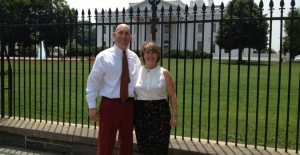 Two Central Florida doctors who are leaders in the UCF Regional Extension Center’s (REC) effort to adopt electronic health records gathered at the White House Tuesday for a conference on how technology can help improve patient care.
Two Central Florida doctors who are leaders in the UCF Regional Extension Center’s (REC) effort to adopt electronic health records gathered at the White House Tuesday for a conference on how technology can help improve patient care.
Dr. Amish Parikh and Dr. Marvin Hardy were among approximately 80 health information technology pacesetters from across the country invited to Washington, D.C., by the White House and the Department of Health and Human Services.
A cardiologist, Dr. Parikh is from Premier Cardiology and Vascular Associates, with offices in Winter Park and Orlando. Dr. Hardy is the medical director of Grace Medical Home, a privately funded clinic for low-income, uninsured patients in Orange County. Executive director Stephanie Garris also attended the Washington conference. Both are working with the REC and are using paperless systems to improve patient care.
Medical providers along with senior White House officials such as Cecilia Muñoz, director of the White House Domestic Policy Council, and Liz Fowler, special assistant to the president for healthcare and economic policy, discussed how health information technology can improve care in communities. On Monday, the office of the National Coordinator for Health IT also hosted a conference for health care professionals. The office announced that more than 100,000 health care providers nationwide are using electronic health records that meet federal standards and have benefitted for federal incentive payments.
As a result of federal health care reform legislation, all medical records must be converted to an electronic format by 2014. Electronic records are expected to improve the quality and efficiency of medical care by making information exchanges easier between health care providers.
The College of Medicine received a $7.8 million federal grant in 2010 to establish a regional health information technology center to help area physicians identify, select and implement EHRs. So far, the REC has enrolled 1,600 Central Florida physicians and 796 have adopted electronic records.
Dr. Parikh said the White House meeting underscored how important EHRs are to patient care. One case discussed involved a St. Louis patient who visited the hospital 52 times in four years. Through the use of electronic health records, a doctor was able to connect all the treatments, make a coordinated plan and provide the patient care with reduced hospital visits.
“Phase 1 is getting the hardware and software into doctors’ offices,” he said. “Phase 2 will be how do you take information and benefit the patient.”
Dr. Hardy said Tuesday’s meeting showed the U.S. government is committed to health information technology. He added that a future challenge will be establishing a nationwide standard to ensure a smooth exchange of information between different health care organizations. “We feel fortunate to be connected to UCF REC,” Dr. Hardy said. “UCF has been helpful in implementing electronic health records.”
